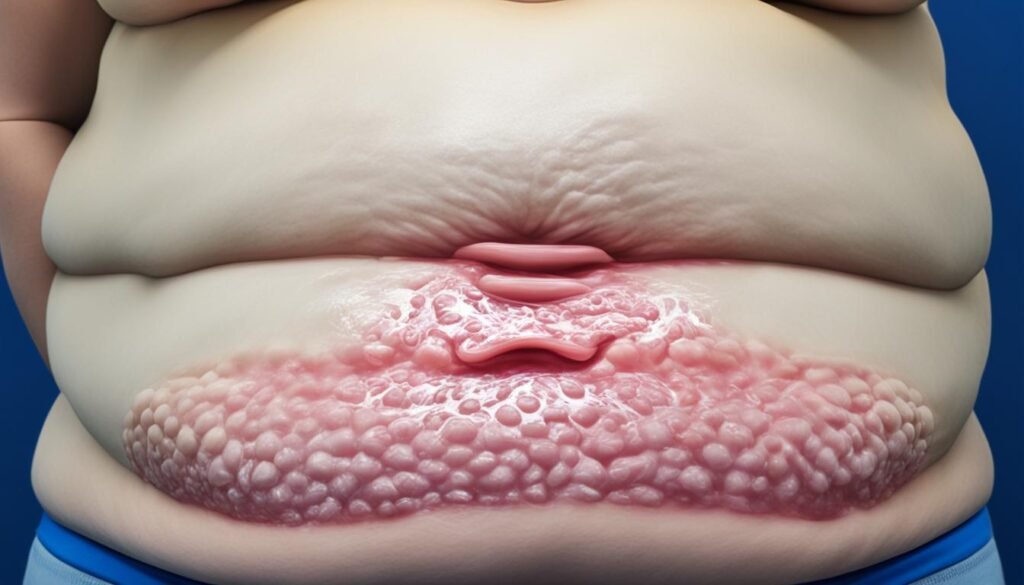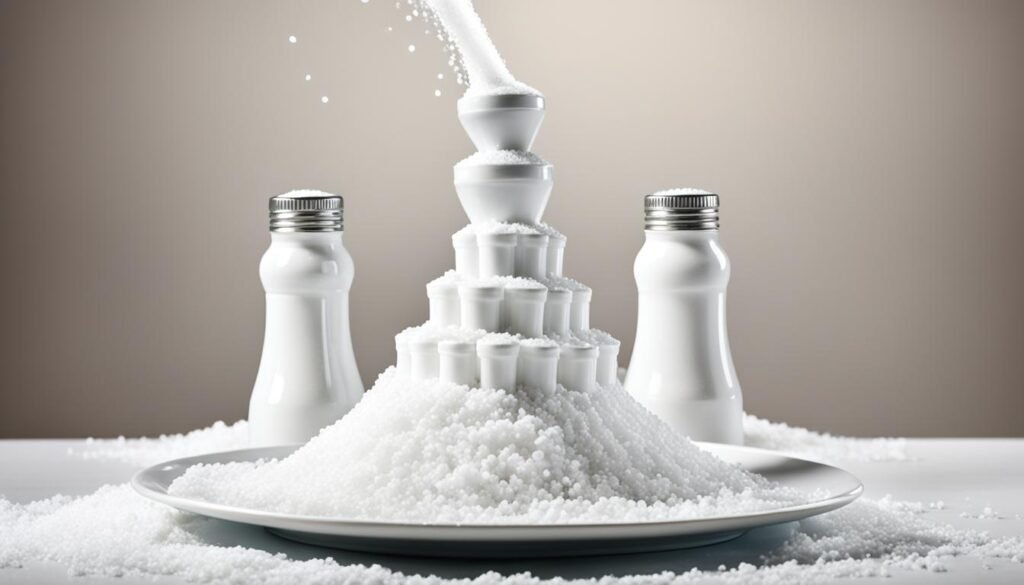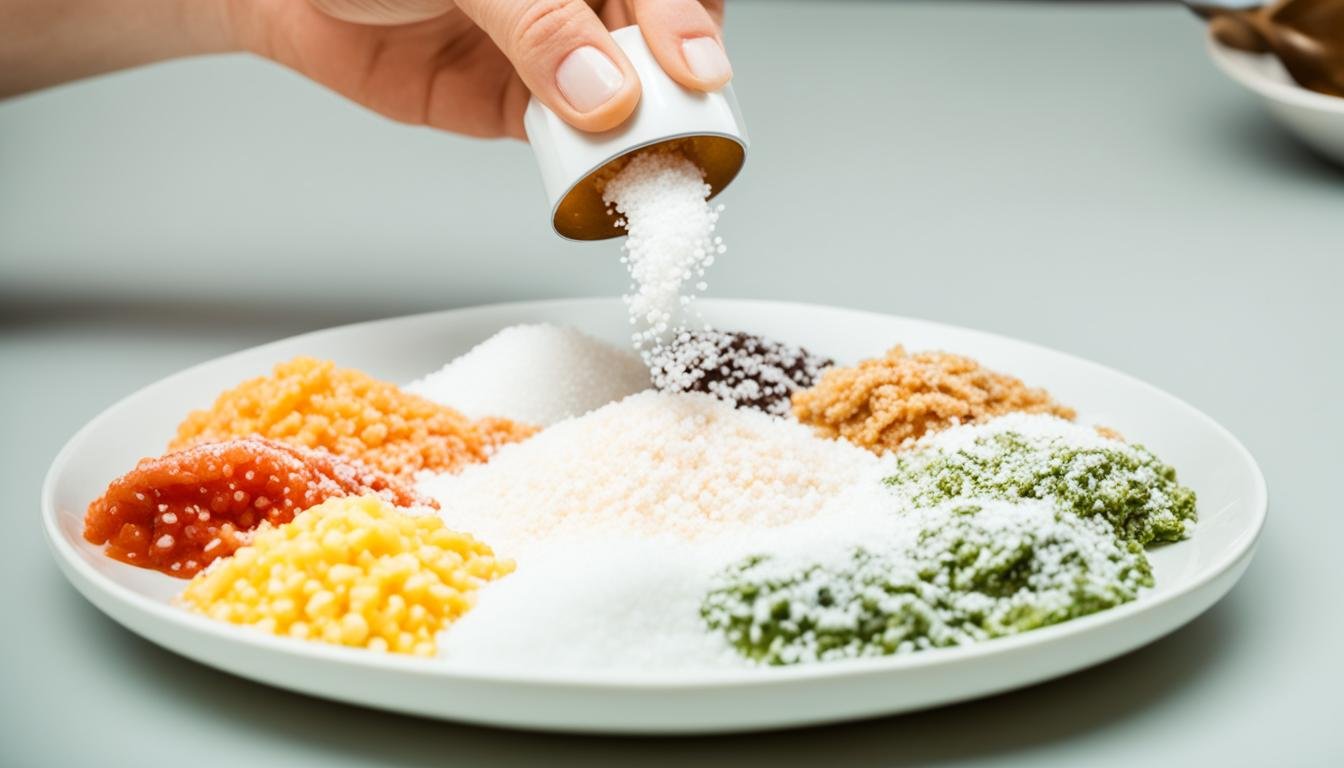Salt makes food taste good and keeps it fresh. It contains 60% chloride and 40% sodium. Most fresh foods are low in sodium, like vegetables, fruits, and nuts. Our body needs just a little sodium, only about 1,500 milligrams every day. But, the typical American eats around 3,400 milligrams. Too much salt can cause serious health issues like stroke, heart disease, and high blood pressure. This article will dive into the short-term and long-term effects of too much excessive salt intake.
Key Takeaways
- Excessive sodium intake can cause short-term effects like water retention, bloating, and temporary high blood pressure.
- Long-term high salt consumption may lead to sustained high blood pressure and an increased risk of stomach cancer.
- The cumulative effects of excessive salt intake can also impact heart health and potentially increase the risk of heart disease and premature death.
- Counteracting high salt intake involves drinking more water, eating potassium-rich foods, and reducing salt at other meals.
- Understanding your individual salt sensitivity can help manage your sodium intake and mitigate negative effects.
Short-Term Effects of Excessive Salt Intake
Eating a lot of salt at once can cause issues in a short time. You might feel water retention and bloating. This happens because your kidneys hold onto extra water to balance the salt you ate.
A salt-rich meal can make your blood pressure go up quickly. More blood moves through your body, which can raise your blood pressure for a bit. Also, you might feel intensely thirsty and need to pee often. Your body is trying to fix its salt and water level.

These effects are how your body fights to stay balanced. But, eating too much salt a lot can have bad long-term effects. We’ll talk about those next.
Long-Term Consequences of High Salt Consumption
Eating too much salt for a long time can really hurt your health. One big issue is it makes your blood pressure go up. Studies show eating a lot of salt raises your blood pressure. But, cutting back on salt can help lower it.
A diet high in salt also raises your chance of getting stomach cancer. A study with over 268,000 people found some interesting facts. It showed those eating 3 grams of salt daily were 68% more likely to get stomach cancer than those only eating 1 gram.

Too much salt can deeply impact your health in the long run. But, knowing the risks and cutting back on salt can help. It’s a step towards a healthier future, reducing the risk of serious illnesses tied to a high-salt diet.
Excessive Salt Intake Side Effects
Too much salt can cause problems in both the short and long term. In the short-term, you might notice bloating and a quick rise in blood pressure. This is because your body holds onto water to balance the salt levels. You might also feel very thirsty and have to pee more than usual.
Over time, eating lots of salt could keep your blood pressure high. It also might up your chances of getting stomach cancer. Plus, it’s not good for your heart and could affect how long you live. Although the exact link between salt and these health issues is still being studied, it’s best to not overdo it with salt in your diet.
| Short-Term Side Effects | Long-Term Side Effects |
|---|---|
|
|
“Having too much salt can lead to several issues, from short-term bloating to long-term health problems like high blood pressure and a risk of cancer. It’s important to be moderate with your salt intake.”

Impact on Heart Health and Longevity
Many debates exist about salty diets, heart disease, and early death. Some studies show too much salt can raise blood pressure and make blood vessels hard. This could increase the chance of heart problems and dying early. For example, a 20-year study revealed those who ate less than 5.8 grams of salt daily lived longer. People who ate more than 15 grams a day were more likely to die early.
Potential Increased Risk of Heart Disease
High salt diets may harm our heart and blood vessels. They can raise blood pressure and make arteries stiff. This can overwork our hearts and boost the risk of heart disease, heart attacks, and strokes.
Premature Death Risk
Eating too much salt could also lead to dying early, studies say. People who eat more salt than recommended might have a higher death rate. But, not all research agrees. Some argue that too little salt is bad for you and could increase heart and death risks.
We need more thorough studies to get a clear answer on salt’s impact on our hearts and how long we live. Knowing this information can help people choose wisely when it comes to salt. It’s about looking out for our health in the long run.

Salt Overdose and Hypernatremia
Fatal salt overdoses are not common but can happen. They occur when people eat too much salt, up to 0.2–0.5 grams per pound of body weight. For someone who weighs 154 pounds, that’s 35–70 grams of salt.
People with health issues like heart, liver, or kidney problems are at more risk from salt overdose. If they eat over 10 grams of sodium every day, that’s about 25 grams of salt, it could even be deadly.
Symptoms of Hypernatremia
Hypernatremia, or too much sodium in the body, brings on some serious symptoms. These include restlessness, trouble breathing or sleeping, less pee, confusion, and bad outcomes like seizures or coma. Knowing these signs and getting help fast is key.
Fatal Salt Overdose Amounts
Just 35–70 grams of salt can be fatal for someone weighing 154 pounds. Certain health conditions make the risk even higher. It’s really important to watch how much salt we eat for our health.
Counteracting High Salt Intake
After eating a very salty meal, you should help your body get back to its usual salt-to-water balance. The first step is simple. Drinking more water is key. This helps your kidneys flush out extra salt. It also lessens bloating by getting rid of excess water.
It’s also smart to eat foods high in potassium. Foods like fruits, veggies, nuts, seeds, legumes, and dairy are full of potassium. This mineral can offset salt’s bad effects.
Lastly, you might need to cut down on your salt intake overall. Much of our salt comes from processed and restaurant food. So, making meals at home with less added salt helps. Use fresh ingredients to lower your salt intake.
Average Salt Consumption and Recommendations
Research shows people eat around 9–12 grams of salt a day. Processed foods are the main source. But, experts suggest cutting down to 1,500–2,300 mg daily. This is about 3.8–5.8 grams, or 2/3–1 teaspoon.
Major Dietary Sources of Salt
Over 70% of our salt comes from processed and restaurant foods. Only about 11% is added when cooking. Naturally, more than 14% of our salt comes from food.
Health Authority Sodium Guidelines
Health experts recommend no more than 2,300 mg of sodium daily. For those with health issues like high blood pressure, even less might be needed. They might aim for 1,500 mg a day.
Salt Sensitivity Factors
Many things play a part in how salt affects us. This includes our genes and hormones. If you add in obesity and getting older, too, the effects of salt can be even stronger.
Not everyone sees their blood pressure go up after eating salty foods. This is known as salt resistance. It happens because of these different influences.
Genetics and Hormones
Recent studies show that our genes and hormones affect how we react to salt. Some genetic differences can make high-salt diets worse for blood pressure. Others are lucky and not as affected.
The hormone aldosterone also jumps in. It affects how our bodies handle salt. These mix of genes and hormones decide if salt hikes our blood pressure.
Obesity and Aging
Being overweight and growing older can make us more sensitive to salt. Extra weight leads to insulin resistance. This messes with how our body manages salt and water.
As we age, our kidneys and some other body functions change. This can also raise our sensitivity to salt. Knowing how these factors work helps us make better salt intake choices for health.
Conclusion
Too much salt in your diet can hurt your health both in the short and long term. Right away, it might make you feel bloated and hold onto water. You could also see a quick rise in your blood pressure. This makes you feel thirsty and pee more often.
But eating lots of salt over time is even worse. It might keep your blood pressure high and up your chances of getting stomach cancer. Plus, it’s really tough on your heart. This could lead to heart disease and dying earlier. Reducing salt in your diet is key to staying healthy and living longer.
To fight these bad effects of salt, drink lots of water. Eat foods high in potassium. And, cut back on salt in your other meals. Knowing how sensitive you are to salt can also help. Things like your genes, hormones, being overweight, and your age matter. Thinking about how much salt you eat and making sure it’s not too much keeps you healthy. It helps you escape the harms high salt can cause.
